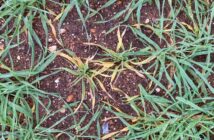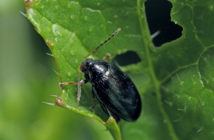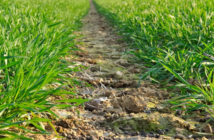BASF now projects its crop protection pipeline to achieve peak sales of 3 billion for products launched between 2015 and 2025. Following its strategy to bring comprehensive solutions to farmers, the company will launch new products for all crop protection indications in row and specialty crops. This promising pipeline is the result of continuous investments in research and development. In 2015 alone, BASF spent 514 million on R&D in the Crop Protection division.
“We have been very successful in translating ideas and challenges into best-in-class products and services for growers across the globe,” said Markus Heldt, President of BASF’s Crop Protection division. “Innovation remains a crucial component of agriculture today. It is a dynamic market, with ever-changing needs and new challenges, and we are happy that we can contribute with new solutions and technologies,” Heldt added.
In the fungicide area, BASF is making great progress in bringing a new blockbuster compound to farmers across the globe starting from 2019 on. Already at an advanced phase of development, the new fungicide has demonstrated outstanding biological performance and is expected to become a key tool for effective disease control. Extensive research on this proprietary compound shows a high potential for broad spectrum activity against a wide range of pathogens in many crops, such as corn, cereals, soy, and specialty crops.
BASF is a leading provider of both novel active ingredients and new formulations for herbicides. A new advanced dicamba formulation is a leading forthcoming innovation in the herbicide field. EngeniaTM is designed for use in dicamba/glyphosate-tolerant cropping systems and is a highly efficient tool for the control of resistant weeds in row crops. Pending registration, EngeniaTM is anticipated to be available first in the Americas later this year.
The herbicide pipeline also includes innovations in herbicide tolerance and weed resistance management technologies. BASF is developing compounds targeting novel sites of action that have shown outstanding control of resistant weeds, such as black grass, in a range of crops. These new introductions should reach markets by the beginning of the next decade. In addition, a new herbicide tolerant system for rice, Provisia™ Rice System, is targeted to enter the market in 2017. These new members of BASF’s herbicide family complement a very attractive portfolio that already offers such star products as Kixor® and the Clearfield® Production System to farmers around the globe.
BASF’s insecticide portfolio is also expanding with two new compounds increasing the number of tools for insect control and resistance management by the end of the decade. The compounds show strong commercial potential and are the result of successful collaboration with other partners. The active ingredient broflanilide brings a new mode of action that has demonstrated excellent levels of control for chewing pests – the biggest insecticide market segment – for use in row and specialty crops as well as the professional pest management market. The other novel active ingredient, Inscalis™, is effective against piercing-sucking insects, providing long-lasting control of aphids, whiteflies, and certain leafhoppers, psyllids and scales for use in specialty crops, row crops and ornamentals. Both products will be launched in several markets across the globe.
“For us, innovation goes beyond the discovery of new molecules and agrochemical compounds,” said Heldt. “We are investing in areas such as IT, formulation technologies, biological crop protection and new business models as well.” In 2015, Functional Crop Care, the business area in BASF that offers solutions for healthier plants and higher yields to supplement conventional crop protection, launched Limus® nitrogen management. Limus® is a patented product that helps crops maintain optimal nitrogen availability through the most critical growth stages of plant development, which leads to more consistent yields. Other solutions from the Functional Crop Care segment are in the market introduction phase and, in total, should generate more than 500 million in sales for BASF by 2020.
“Although commodity prices have been lower and the agrochemical sector has slowed down, we have full confidence in the long-term global trends,” said Heldt. “We need a robust agriculture sector as the basis for our planet’s future growth. We can only support farmers’ success in delivering healthy and affordable food if we continue to invest in new sustainable solutions to increase their yields. So that is what we will continue to do,” concluded Heldt.
BASF’s track record in successfully commercializing new products has proven to be a key growth pillar for the Crop Protection unit. Recently, more than 40% of the business sales were generated by products launched in the past five years. To further expand its market success with innovations, BASF Crop Protection will continue to invest approximately 9% of its sales in R&D.



